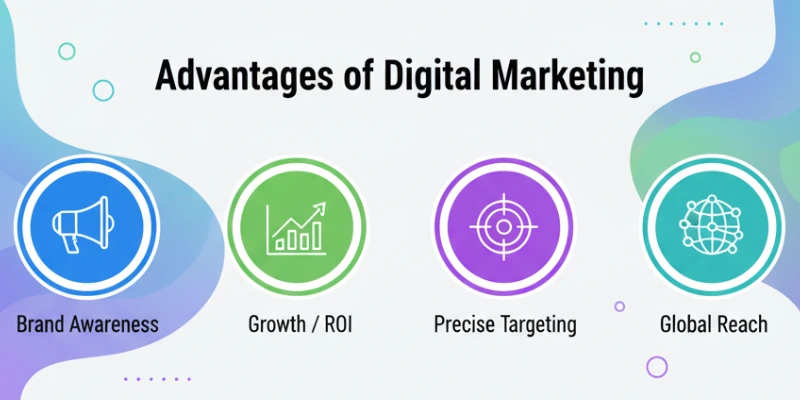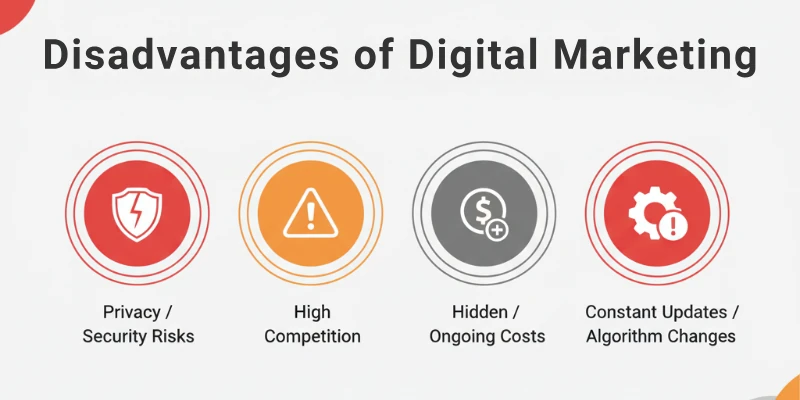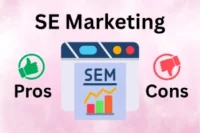Advantages and Disadvantages of Digital Marketing
Published: 5 Sep 2025
Let’s dive into the world of digitalization marketing and see what’s good and not-so-good about it. I mean, we’re going to talk about the advantages and disadvantages of digital marketing in this blog post.
That’s just a fancy way of saying the pros and cons of using the internet to promote stuff. Digital marketing means doing things like advertising on social media, emails, and websites. It’s like bringing the traditional way of selling to the online world.
So, let’s find out what’s cool about it and what you might need to watch out for!
Advantages of Digital Marketing
In the world of business promotion, digital marketing stands out for its numerous benefits. It’s like having a powerful toolkit for businesses to reach a global audience, save costs, and connect with customers in real-time.

So, let’s quickly explore 15 main benefits of digital marketing in detail:
- Global Reach
- Cost-Effectiveness
- Targeted Advertising
- Measurable Results
- Improved Customer Engagement
- Personalization
- Enhanced Brand Visibility
- Real-time Interaction
- Access to Analytics
- Flexibility and Adaptability
- Quick Campaign Deployment
- Better ROI Tracking
- Increased Sales Conversions
- 24/7 Availability
- Enhanced Customer Support
Dig in with me!!!!
1. Global Reach
Digital marketing lets companies connect with people all over the world, regardless of where they are located. It increases the size of the market and lets people in on international business possibilities. This global presence makes the company more visible in many places.
2. Cost-Effectiveness
Digital marketing is often less expensive than old-fashioned ways of selling. Online platforms offer choices that are easy on the wallet, which helps businesses get the most out of their spending. Companies can get a better return on their investment when they use cost-effective methods.
3. Targeted Advertising
Digital marketing lets companies send messages that are more relevant to people based on their age, gender, interests, and actions. Targeted approaches make ads more relevant, which makes them work better. This makes sure that marketing efforts are aimed at the right people.
4. Measurable Results
With digital marketing, you can use detailed analytics to see how well your efforts are doing. Key performance indicators help companies keep track of and understand how their marketing is working. This method, which is based on data, lets strategies keep getting better and better.
5. Improved Customer Engagement
Online marketing encourages customers to interact with you through different digital platforms. Businesses can connect with their audience in more dynamic ways through social media, blogs, and other platforms. Businesses and buyers have stronger relationships when both are more engaged.
6. Personalization
With digital marketing, companies can send customized texts to customers based on what they like. Customizing things to fit each person’s tastes makes the experience better for the customer. Personalization makes the link between a brand and its customers stronger.
7. Enhanced Brand Visibility
Utilizing digital marketing across various online platforms increases how often people see and recognize your brand. Constant online presence strengthens brand visibility. Enhanced brand visibility contributes to building a strong and recognizable brand image.
8. Real-time Interaction
By using digital marketing, companies can quickly talk to their customers. Quick replies to comments and messages encourage exchanges that are dynamic and responsive. Real-time interaction builds trust and enhances the overall customer experience.
9. Access to Analytics
Businesses can use digital marketing tools to get specific analytics about how people behave online. Analyzing user data can help you figure out how well your marketing tactics are working. Analytics-based decision-making helps with continuous growth.
10. Flexibility and Adaptability
With digital marketing, you can change your plans right away if the market conditions change. Campaigns can be changed quickly by businesses to keep up with changing customer wants and trends. This ability to change makes sure that marketing stays useful and successful.
11. Quick Campaign Deployment
Digital marketing lets campaigns go live quickly across many online platforms. Businesses can take advantage of timely opportunities when they can adopt solutions quickly. This flexibility in launching campaigns speeds up and improves the effectiveness of marketing plans.
12. Better ROI Tracking
Digital marketing lets you keep track of everything in great detail so you can figure out your return on investment (ROI). Businesses can correctly figure out how well the money they spend on marketing is working. Better tracking of ROI helps people make smart decisions and make the best use of their resources.
13. Increased Sales Conversions
Targeted advertising and personalized content are two examples of digital marketing approaches that help to increase conversion rates. Businesses improve their chances of converting leads into customers by reaching out to the correct audience with relevant messages. Increased sales conversions are an important statistic for assessing the efficiency of digital marketing initiatives.
14. 24/7 Availability
Digital marketing ensures a continuous online presence, allowing businesses to engage with their audience 24/7. Customers can access information, make purchases, or interact with the brand at any time. This around-the-clock availability accommodates diverse schedules and time zones.
15. Enhanced Customer Support
Direct communication channels enabled by digital marketing platforms provide for better client service. Businesses may respond to client requests, issues, and feedback on time. Improved customer service increases client satisfaction and loyalty.
Disadvantages of Digital Marketing
After exploring the numerous merits of digital marketing, it’s crucial to learn about the potential challenges and drawbacks associated with this dynamic approach.

So, let’s explore the cons of digital marketing.
- Saturation and Competition
- Dependency on Technology
- Security Concerns
- Information Overload
- Skill and Knowledge Gaps
- Ad Blockers
- Privacy Concerns
- Rapid Technological Changes
- Initial Setup Costs
- Measurement Challenges
Let’s dig in!
1. Saturation and Competition
Online fields can become crowded with businesses competing for people’s attention, making it difficult to stand out. With so many competitors, it’s difficult to stand out, and businesses may struggle to effectively reach their target audience. The high degree of competition may result in higher advertising expenses and a diluted influence on potential customers.
2. Dependency on Technology
Digital marketing is primarily dependent on technology, and technical concerns such as website crashes or bugs can throw off marketing campaigns. Businesses must stay up to current on ever-changing technological developments because any failure in digital tools can disrupt campaign implementation. Businesses that rely on technology may face hurdles when attempting to attract audiences with limited access to digital devices.
3. Security Concerns
The digital landscape presents security dangers, including the possibility of hacking and data theft on critical customer information. Concerns about online privacy may cause customers to be hesitant to share personal information, reducing the efficacy of personalized marketing campaigns. Protecting against security threats has become an essential component of digital marketing tactics.
4. Information Overload
Consumers may experience information overload due to an excess of digital content. Promoting attempts may not work as well because people may get used to marketing messages. To avoid adding to the noise and make sure their words reach the right people, businesses need to carefully choose the content they share.
5. Skill and Knowledge Gaps
Successful digital marketing involves specialized skills and expertise that some companies or people may lack. Because digital platforms change so quickly so it requires ongoing learning to keep up with trends and innovations. Skill shortages could prevent the successful execution of digital marketing initiatives.
6. Ad Blockers
Ad blockers restrict ads from being seen, making it difficult for businesses to reach their target audience successfully. Ad blockers make it difficult for marketers to ensure that their messages are seen and engaging. Creative content that users are less likely to block becomes critical in overcoming ad blocker barriers.
7. Privacy Concerns
The use of client data in digital marketing poses privacy concerns. Users may be hesitant to disclose personal information, which reduces the efficiency of targeted advertising. Striking a balance between personalization and respecting user privacy is vital for maintaining trust.
8. Rapid Technological Changes
The digital landscape evolves rapidly, requiring businesses to constantly adapt. Keeping up with technological changes can be challenging, particularly for smaller businesses. But staying adaptable is crucial in navigating the evolving digital environment.
9. Initial Setup Costs
Setting up digital marketing may cost money at first, for things like equipment and skilled workers. Smaller businesses might find it hard to set up the necessary tools, which could hurt their ability to compete online. When planning digital marketing projects, it’s important to keep both expenses in mind.
10. Measurement Challenges
It can be hard to figure out how successful digital marketing is because there are so many factors to look at. Businesses may have trouble correctly understanding data. To solve problems with measurements, you need to be dedicated to learning how to use analytics tools.
Conclusion
In the end, the advantages and disadvantages of digital marketing show us both its power and its challenges. It gives businesses a faster and cheaper way to reach people, but it also needs time, planning, and constant updates to stay effective.
My personal recommendation is to focus on the advantages while learning how to handle the disadvantages, because balance is the key to success. If used wisely, digital marketing can truly help any business grow. Goodbye and thanks for reading.
FAQs
Here are some of the commonly asked questions related to pros and cons of digital marketing:
Digital marketing helps businesses reach a wider audience at a lower cost. It allows targeted advertising to the right people. You can track results easily with analytics. It also helps build stronger brand awareness online.
Digital marketing requires constant updates and trends change fast. There is high competition online. Some strategies take time to show results. It may also need technical knowledge and proper tools.
Small businesses can compete with larger ones through digital platforms. They can reach local and global customers easily. It allows cost-effective promotions compared to traditional ads. Social media helps them engage directly with their audience.
Digital marketing is more cost-effective than traditional methods. It gives faster results and real-time feedback. You can target a specific audience with ease. However, some people still trust traditional ads more.
There is a risk of negative reviews or online criticism. Cybersecurity threats can harm brand reputation. Ad budgets can be wasted without proper strategy. Too much competition may make it hard to stand out.
Most people spend time online, so businesses must be visible there. It helps brands connect with their target customers. It improves sales and brand loyalty. Without it, companies may lose to competitors.

- Be Respectful
- Stay Relevant
- Stay Positive
- True Feedback
- Encourage Discussion
- Avoid Spamming
- No Fake News
- Don't Copy-Paste
- No Personal Attacks

- Be Respectful
- Stay Relevant
- Stay Positive
- True Feedback
- Encourage Discussion
- Avoid Spamming
- No Fake News
- Don't Copy-Paste
- No Personal Attacks





